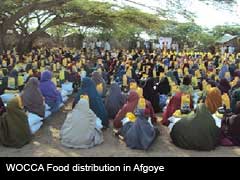Emergency Response
Somalia is a country hit by both war as well as natural disasters. Apart from the conflicts, almost every year there are floods occurring in the areas we work in and at the same time droughts can occur, heavily affecting the livelihoods of agro pastoralists. Whenever these events are happening, WOCCA tries to respond in ways to reduce the impacts of these disasters. This can be the buying of livestock before it dies, or supply and chlorination of water. Interventions are always discussed with the community to ensure the people that are benefitting are the ones that are really in need.
emergencies
The Somali people have been one of the most unfortunately society in this world in the past twenty years. In the 1991 the county descended into anarchy and from that point the Somali vulnerable communities were exposed to the elements. Somalis became susceptible to emergencies such as awd outbreak, droughts, famine as over 4 million people left their homes in search of security, food and shelter. WOCCA is in solidarity with the people of Africa and particularly the people of Somalia in dealing with these life threatening hardships. We work closely with the vulnerable people and support them in their endeavours – saving their lives and those of their families. There are recurring events in the country, ost recently, the famine that has killed a great number of Somali children. WOCCA was there to save the lives of over 140,000 individuals and their livestock that went through a life threatening situations. Emergencies require emmediate life saving interventions and WOCCA has expertise in these areas. These unexpected events can vary in different forms and require different responses as intervened by WOCCA and their partners in the country.
- Outbreaks of cholera or acute watery diarrhea; generally responded with chlorination of water sources, hygiene promotion and hygiene kits distribution
- Famine; which response is provision of food aid, cash for work or unconditional cash
- Flooding; which can be responded by the provision of non food items, food and shelter
- Sudden displacement through fighting; which triggers a general response that can be a combination of all of the above
- Acute and livelihood situation: providing nutritional supplementary feeding for children and pregnant/lactating women
- Protection and human rights violation: This takes place as warring factions continue fighting without the slightest regard to human rights: WOCCA endeavours to minimum the violations towards women and children in the form of awareness raising, advocating for the rights of the vulnerable people, provision of dignity kits etc.
Some of the events are, to a limited extend, predictable while others are not. For example there is a so called cholera season’ and WOCCA has supplies in it’s store in Jowhar from where it can supply people that live in an area of outbreak.
 Other events can be quite unpredictable. The famine of 2011 is an example of that. It is true that almost every year there are categories of people who do not have sufficient food. They are malnourished but they do not die of acute food shortage because institutes such WOCCA intervene in time. In 2011 there was a complete harvest failure, and despite the fact there was a bumper harvest only half a year before that, most people did not have any access to food.
Other events can be quite unpredictable. The famine of 2011 is an example of that. It is true that almost every year there are categories of people who do not have sufficient food. They are malnourished but they do not die of acute food shortage because institutes such WOCCA intervene in time. In 2011 there was a complete harvest failure, and despite the fact there was a bumper harvest only half a year before that, most people did not have any access to food.
During these difficult times WOCCA implemented two food projects in Middle Shabelle funded by OCHA. People got vouchers worth a certain amount of food. This way people had access to food and local traders had a boost to their economy.
On the sectoral pages under ‘areas of intervention’ one will be able to learn how WOCCA intervened the most acute emergencies in the country. Floods are recurring phenomena and unless there is a strong government that can regulate or provide water management system for the people who live close to the river it will unlikely to solve this problem.
Lifesaving emergencies per sector:
Food Security: Aim to make sure people do not die because of lack of food
Water Hygiene and Sanitation (WASH): Aim is to ensure people have access to clean water
Nutrition and NFI’s: Aim is provide supplementary feeding to those are malnourished and likely to die because of it. In addition WOCCA provide non food items for IDP and those who have been displaced
Protection and Human Rights: Aim to minimize unrightfully violations towards women and children Education: Aim is to minimize illiteracy among Somali youth especially the girl-child


 Somalia
Somalia Kenya
Kenya